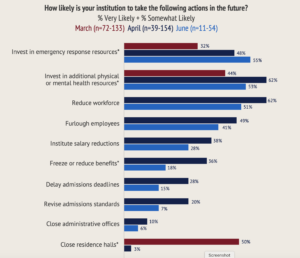
‘Inside Higher Ed’ sample chart for its third Covid survey
Inside Higher Ed and Hanover Research have released a new survey about COVID-19 concerns on campuses. Respondents were 97 presidents or chancellors at private (about 70%) and public universities, as well as some two-year public institutions. The June 2020 survey is compared with ones in March and April.
Unsurprisingly, 96% of those who replied to the survey said in June they were “somewhat or very concerned” about unbudgeted costs due to COVID. This number was 87% in March and 84% in April. The increase may be due to the failure to control the infection as anticipated, which puts in-class instruction at risk for at least the fall.
Similarly, worries about the physical health of employees (85/69/82%) and of students (81-73-80%) seem to reflect changing news about transmission. (Many expected the virus to quiet in the summer months, and teens were said for a while not to be as effective carriers.)
In four survey categories the numbers for those “very concerned” and “somewhat concerned” are high and relatively unchanged since the pandemic first hit: decline in overall future student enrollment; inequitable impact on under-represented students; overall financial stability; and ability to afford to employ staff and faculty.
Fewer than half were very or somewhat concerned for perceived negativity regarding their institutional response.
Perhaps they should be more concerned, considering what could happen. Or maybe they are, but are not saying so, to boost confidence and a return to normality.
After all, only 56% responded they were confident they could provide for the safety of faculty; that number fell for the safety of staff members (54%), students in housing (53%), and vulnerable people in the community surrounding campus (39%). Only 29% were confident their institutions would “help students behave responsibly (eg, social distancing) on their own.”
It is an admission of failure, but those administrators will not, or feel they cannot, say the following in welcome letters:
“We know people will get sick. Some will die. We do not know how many. We are told by scientists, some of them our own faculty, that the disease may affect your bodies for as long as you live. We are opening because our business is education, and time is ticking on students’ futures, and we need the money. (‘We,’ by the way, will not include everyone, in our talk of a campus family. [A quarter of respondents said they would never reverse their reduced workforces; another 39% said they had no timetable to do so.]) We are making our choices and going for broke.”
What the letters actually sound like, is this, from one sent to my son, who will be a freshman at a flagship in three weeks, in the raging heart of the contagion:
“[We] are extremely excited to welcome you to campus for the fall semester. We know you’ve had to work very hard to join our…Family, and we want you to know that we’re hard at work to prepare for your arrival and the safe reopening of our campus—and we can’t wait to have you here!”
Five paragraphs of PR boilerplate follow. (“We all have a role to play…!”) What should come after the signature of the interim president is a postscript that says: “Personal loyalty to a corporation is misguided.” Instead, the governor calls for prayer and fasting.
